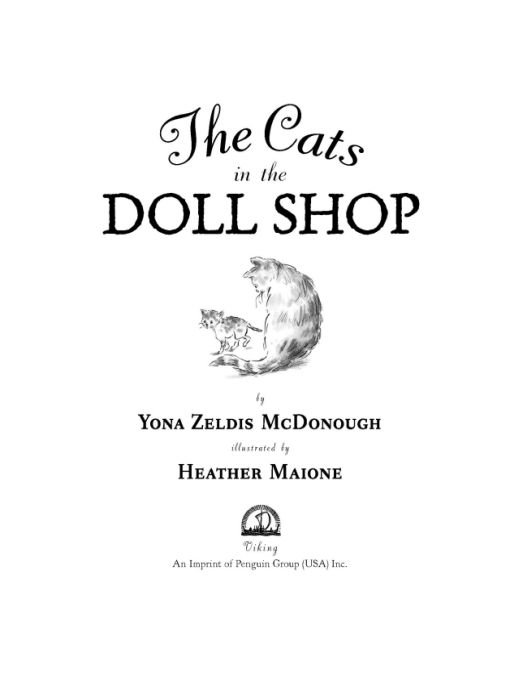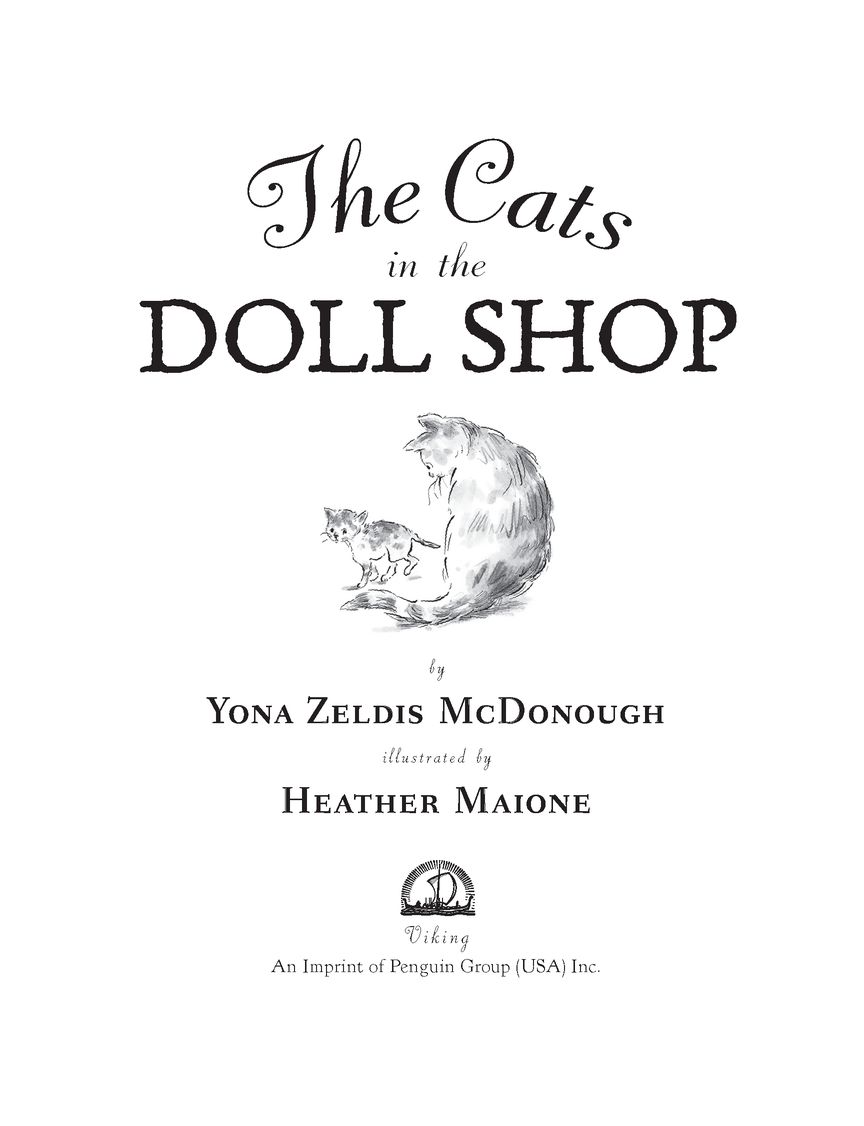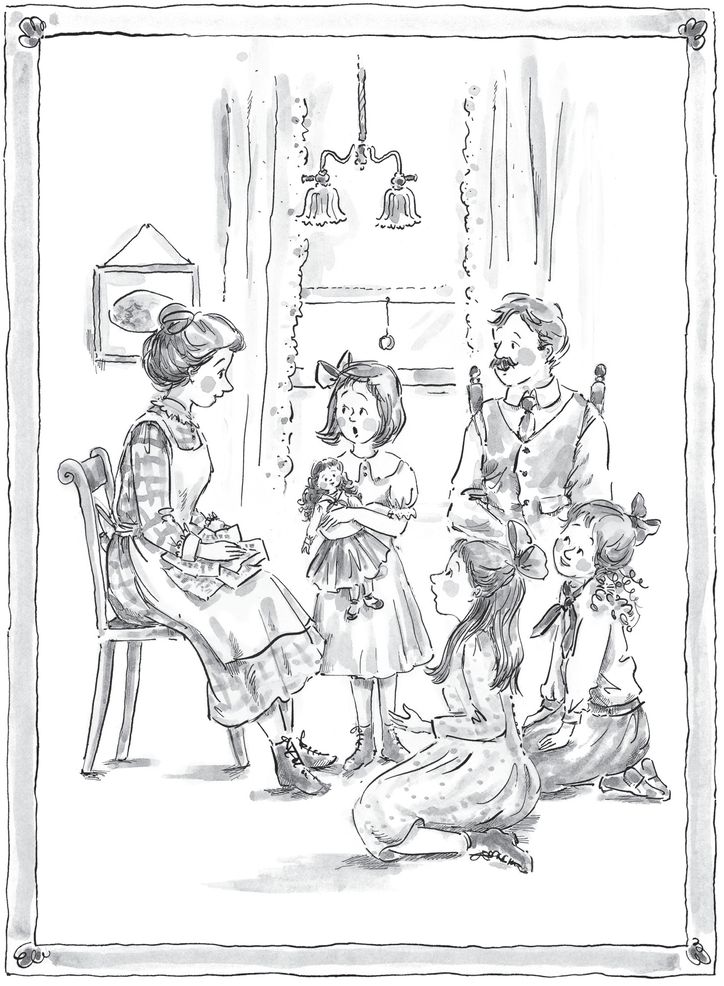The Cats in the Doll Shop
Read The Cats in the Doll Shop Online
Authors: Yona Zeldis McDonough


Table of Contents
Â
Â
Â
In memory of my grandmother Tania Brightman: tiny, fierce, and fiercely missed
âY. Z. M.
âY. Z. M.

Â
To my sister Carla
âH. M.
âH. M.
Viking
Published by Penguin Group
Penguin Young Readers Group, 345 Hudson Street, New York, New York 10014, U.S.A.
Penguin Group (Canada), 90 Eglinton Avenue East, Suite 700, Toronto, Ontario, Canada M4P 2Y3
(a division of Pearson Penguin Canada Inc.)
Penguin Books Ltd, 80 Strand, London WC2R 0RL, England
Penguin Ireland, 25 St Stephen's Green, Dublin 2, Ireland (a division of Penguin Books Ltd)
Penguin Group (Australia), 250 Camberwell Road, Camberwell, Victoria 3124, Australia
(a division of Pearson Australia Group Pty Ltd)
Penguin Books India Pvt Ltd, 11 Community Centre, Panchsheel Park, New Delhi â 110 017, India
Penguin Group (NZ), 67 Apollo Drive, Rosedale, Auckland 0632, New Zealand (a division of Pearson New Zealand Ltd.)
Penguin Books (South Africa) (Pty) Ltd, 24 Sturdee Avenue, Rosebank, Johannesburg 2196, South Africa
Published by Penguin Group
Penguin Young Readers Group, 345 Hudson Street, New York, New York 10014, U.S.A.
Penguin Group (Canada), 90 Eglinton Avenue East, Suite 700, Toronto, Ontario, Canada M4P 2Y3
(a division of Pearson Penguin Canada Inc.)
Penguin Books Ltd, 80 Strand, London WC2R 0RL, England
Penguin Ireland, 25 St Stephen's Green, Dublin 2, Ireland (a division of Penguin Books Ltd)
Penguin Group (Australia), 250 Camberwell Road, Camberwell, Victoria 3124, Australia
(a division of Pearson Australia Group Pty Ltd)
Penguin Books India Pvt Ltd, 11 Community Centre, Panchsheel Park, New Delhi â 110 017, India
Penguin Group (NZ), 67 Apollo Drive, Rosedale, Auckland 0632, New Zealand (a division of Pearson New Zealand Ltd.)
Penguin Books (South Africa) (Pty) Ltd, 24 Sturdee Avenue, Rosebank, Johannesburg 2196, South Africa
Penguin Books Ltd, Registered Offices: 80 Strand, London WC2R ORL, England
First published in 2011 by Viking, a division of Penguin Young Readers Group
Text copyright © Yona Zeldis McDonough, 2011
Illustrations copyright © Heather Maione, 2011
All rights reserved
LIBRARY OF CONGRESS CATALOGING-IN-PUBLICATION DATA
McDonough, Yona Zeldis.
The cats in the doll shop / by Yona Zeldis McDonough ; illustrated by
Heather Maione.
p. cm.
McDonough, Yona Zeldis.
The cats in the doll shop / by Yona Zeldis McDonough ; illustrated by
Heather Maione.
p. cm.
Summary: With World War I raging in Europe, eleven-year-old Anna is thrilled to learn that her cousin Tania is coming from Russia to stay with Anna's family on the lower East Side of New York, and although Tania is shy and withdrawn when she arrives, her love of cats helps her adjust to her new family.
ISBN : 978-1-101-54811-0
[1. ImmigrantsâNew York (State)âNew YorkâFiction. 2. CatsâFiction. 3. CousinsâFiction.
4. DollsâFiction. 5. JewsâUnited StatesâFiction. 6. New York (N.Y.)âHistoryâ1898-1951âFiction.]
I. Maione, Heather Harms, ill. II. Title.
4. DollsâFiction. 5. JewsâUnited StatesâFiction. 6. New York (N.Y.)âHistoryâ1898-1951âFiction.]
I. Maione, Heather Harms, ill. II. Title.
PZ7.M15655Cat 2011 [Fic]âdc22 2011009312
1
W
ORDS FROM FAR AWAY
ORDS FROM FAR AWAY
It all starts with the letters. Not that letters, all by themselves, are such an odd thing. Papa and Mama run Breittlemann's Doll Shop, where they make dolls, and they get letters all the time: from Mr. Greenfield, the buyer at the big, fancy toy store uptown called F.A.O. Schwarz, and from buyers at other stores, too. There are letters from suppliers of the different materials they use: velvet and cotton, wool and felt. Sometimes they get letters from people who have bought one of the dolls and want to know if there are any new models available.
But the letters I am talking about are different. They come all the way from Russia, where Mama and Papa were born, and they arrive in fragile envelopes that tear when they are opened. My sisters and I can't read what is in the letters, because they are written in Yiddish, which is the language both of my parents' families spoke back in what Mama calls the “old country.” Sophie, my big sister, can understand Yiddish when she hears it spoken, but even sheâa regular smarty-pants, all A's and gold stars at schoolâcannot understand the words, which are written in Hebrew letters and crowded onto the thin, pearl gray sheets of paper.
First the letters come only once in a while. Then we begin to notice that they are coming every week, sometimes even twice a week. Mama rips the envelopes in her haste to open themâdid I mention they are fragile?âand all the features on her face seem to draw together, as if pulled tight by a thread, as she reads. Sometimes she looks worried long after she has finished reading the letters. Tonight is one of those times.
“What's wrong, Mama?” asks Trudie, my younger sister. It is a Sunday in August, and we're all sitting together at our small, crowded table. Dinnerâcold beet soup called borscht, with dumplings and breadâis over, and I am wondering if Mama will let us go downstairs and play in the doll shop. Even though we girls are getting olderâTrudie is nine, I'm eleven, and Sophie is thirteenâwe still like to play with our dolls.
“Nothing's wrong,” Mama says to Trudie. But the tone of her voice lets me know this is not true, and because of this, I don't ask to go downstairs after all. I decide to stay up here, so I can keep an eye on what is happening. And sure enough, after Sophie and I have finished doing the dinner dishes, Mama calls us all together in the tiny parlor that is just off the kitchen. Papa sits in his chair on one side of the room. Mama sits in her chair on the other. But instead of the sewing basket she usually brings out in the evenings, she has the lettersâall of them it seemsâfanned out in her lap.
“Girls, we are going to have a visitor,” Mama says.
“A visitor? Who is it?” Trudie asks.
“Is it someone we know?” asks Sophie.
“Not yet,” Mama says, glancing over at Papa. “But you'll get to know her soon. In fact, you'll get to know her very well.”
“Tell us who it is, Mama!” Trudie pleads.
“It's your cousin Tania,” Mama says.
“She's Aunt Rivka's daughter,” I say. Mama has told us about her. “She and I have exactly the same birthday and we're exactly the same age. You said it was a coincidence that you and your sister both had baby girls on the very same day.”
“That's right, Anna!” says Mama.
“So what's she like?” Sophie asks me, as if she didn't quite believe it when I said I remembered hearing about her.
“Well, she has blonde hair . . .” I begin. I am not actually sure about this, but when I speak again, I try to make my voice sound very confident anyway. “Long blonde hair and bright blue eyes. Blue as . . .” I have to think for a minute. “Blue as forget-me-nots.”
“You've never even
seen
a forget-me-not,” says Sophie. She tosses her own shining brown hairâalways brushed, always neat, and always perfectâback over her shoulders.
seen
a forget-me-not,” says Sophie. She tosses her own shining brown hairâalways brushed, always neat, and always perfectâback over her shoulders.
“How do you know?” I say hotly. Sophie and I get along pretty well most of the time, but every now and then she acts like she knows everything and I know just about nothing. I don't know why it's important to me to insist that Tania is blonde and blue-eyed. Maybe it's because I know Sophie wishes she were both.
“That's enough, girls,” says Mama. “Tania does have blonde hair, or at least she did when she was a baby. It might have gotten darker by now. And Rivka says her eyes are very blue. But that's not what's important right now.”
“What
is
important, Mama?” Trudie asks. She is clutching her doll, Angelica Grace, to her chest. “The reason she's coming here?”
is
important, Mama?” Trudie asks. She is clutching her doll, Angelica Grace, to her chest. “The reason she's coming here?”
“Yes, that's it,” says Mama. “The reason that she's coming here.” Mama puts her arm around Trudie. “You see, her papa died when she was a baby, and she has no brothers and sisters. So for a long time, it was just Rivka and Tania, living together in their little village. But now Aunt Rivka wants to move to the city. She's going to be a maid in a very fine house in Moscow.”
“Isn't that a good thing?” I ask. I know about the Great War that is still going on in Europe. Papa has said that jobs are scarce, and so I would think Aunt Rivka is lucky to have found one.
“It is, except the house where Rivka will be working has no place for Tania.”

“Then where will she live if she can't live with her mother?” asks Trudie. She runs a finger across her doll's smooth, painted face.
“That's exactly why she's going to come to live here,” says Papa, leaning forward in his chair. “And if she lives here, she'll be able to go to school, like you girls do. She'll learn to read and write and add and subtract. That means she'll have some choices about what she wants to do when she's grown upâjust like all of you.”
“I'm going to be a teacher,” Sophia declares.
“And I'm going to be a ballerina!” adds Trudie. Trudie does love to dance.
“You can't just decide to
be
a ballerina,” Sophie says. “You have to study for a long, long time.”
be
a ballerina,” Sophie says. “You have to study for a long, long time.”
“Oh well,” says Trudie. “So I won't be a ballerina. I'll be an actress then. Or a singer.” She seems to consider the possibilities. “I knowâa nurse! Just like Nurse Nora.” With her jaunty little outfit and sweet, caring expression, Nurse Nora is the most popular of the dolls we make in the shop.
I can see that Sophie does not believe any of this. She has that I'm-so-grown-up look on her face. Maybe I shouldn't even say what I want to be. Sophie will find some way to make me think it's not possible. Or that it's silly. But I decide I don't care.
“I'm going to be a writer,” I announce boldly. “I'll write stories and poems and maybe even plays.” Everyone turns to look at me. “My books will be published in beautiful leather-covered volumes with gold lettering on the front. People everywhere will read them. They'll be in libraries all over the city. No, all over the country.”
Other books
Untrained Eye by Jody Klaire
The Weight of Honor by Morgan Rice
Sneaky Pie's Cookbook for Mystery Lovers by Rita Mae Brown
Coexist: Keegan's Chronicles by Julia Crane
Life Next Door (Love Not Included Series Book 2) by J. D. Hollyfield
The Eagle of the Ninth [book I] by Rosemary Sutcliff
Blackouts and Breakdowns by Rosenberg, Mark Brennan
Phase One: Identify (Territory of the Dead) by Wynters, Rose
Six Four by Hideo Yokoyama
Accidental Peers 03 - Compromising Willa by Diana Quincy